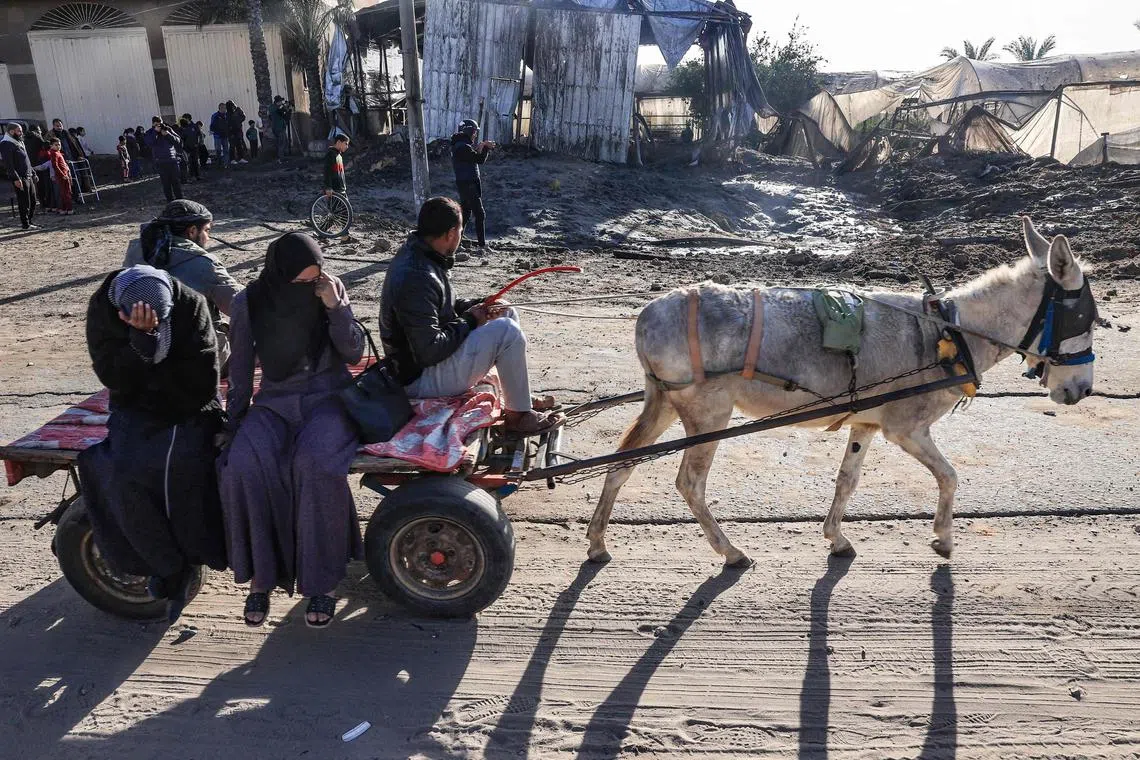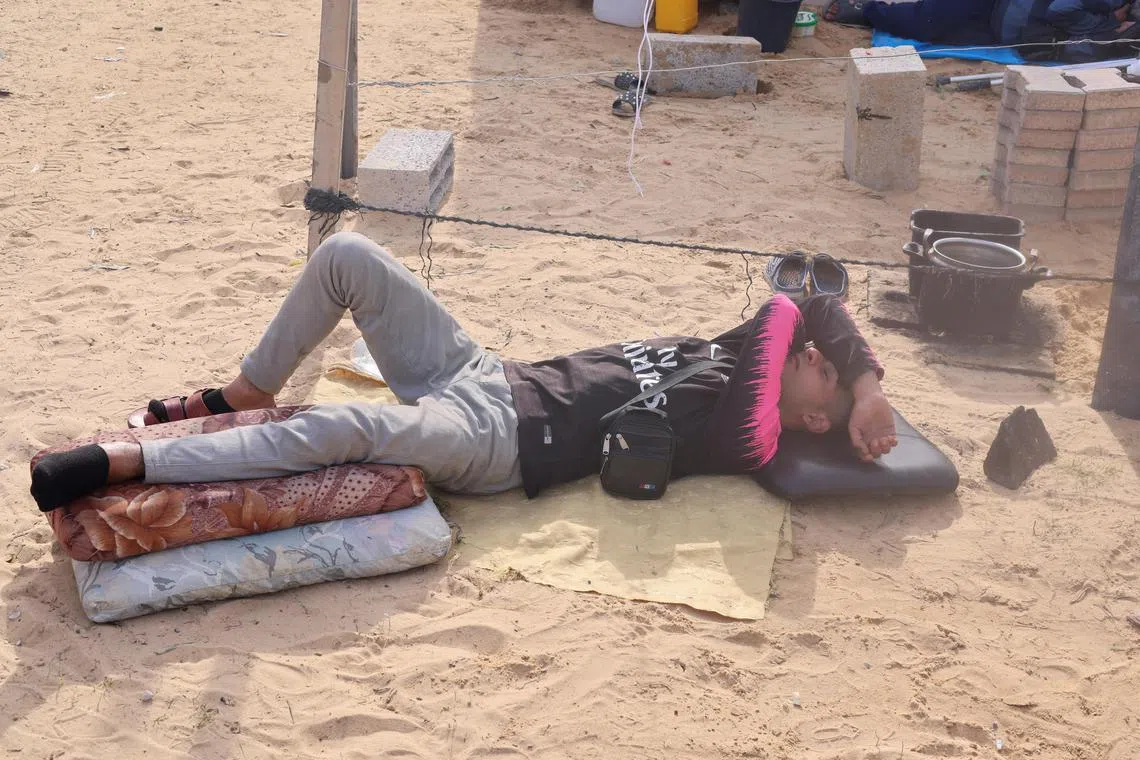Gaza residents mass at border for safety, but find only more peril
Sign up now: Get ST's newsletters delivered to your inbox

With Israeli forces attacking southern Gaza, Gazans have flocked to the border area in search of safety and supplies.
PHOTO: AFP
DOHA, Qatar – The last point of refuge for Palestinians fleeing from Israel’s relentless siege of the Gaza Strip is collapsing under the weight of tens of thousands of people seeking food and shelter.
It has stirred fears of a potential mass displacement into Egypt, United Nations officials warned on Dec 10.
Pressure is mounting in Rafah, the area near Gaza’s southern border with Egypt, where many Palestinians have tried to escape Israel’s military campaign against Hamas, only to find more death, hunger and desperation.
“Where should I go? Tell me, where should I go?” said Mr Raif Naji Abu Lubda, 39, a farmer who fled to the border area with his wife and six children.
The family is now sleeping on the ground in the cold and cannot find food or even salty water to drink, he said.
Still, Mr Abu Lubda said, he would rather “go home and die there” than be forced into Egypt’s Sinai Peninsula.
It is a scenario that Egypt and other Arab governments, in any event, have flatly rejected.
They fear that if large numbers of Palestinians leave Gaza, Israel will not allow them to return.
In some wars, civilians can escape the violence by fleeing to neighbouring countries, with the understanding that they will return home after the fighting stops.

A displaced Palestinian, who fled his house due to Israeli strikes, rests next to a tent, at a camp in Rafah in the southern Gaza Strip.
PHOTO: REUTERS
But the displacement of Palestinians caused by the creation of Israel in 1948 and the decades of conflict since have left Arab governments scared that Israel might use the war to push Palestinians out of Gaza permanently.
Speaking at a conference in Qatar on Dec 10, Jordanian Foreign Minister Ayman Safadi said Israel’s military campaign amounted to “a systematic effort to empty Gaza of its people”.
Much of Jordan’s population are Palestinians whose ancestors fled or were driven from what is now Israel – an event that Palestinians call the “Nakba”,
At the same conference in Qatar, United Nations Secretary-General Antonio Guterres raised concerns that the terrible conditions for Palestinians crowded near Gaza’s border with Egypt created the possibility of a “mass displacement” into Sinai.
“There is no effective protection of civilians in Gaza,” Mr Guterres said. “I expect public order to completely break down soon, and an even worse situation could unfold.”
The Israeli authorities, including the Foreign Ministry and the Prime Minister’s Office, declined to comment about the Jordanian Foreign Minister’s allegations.
Earlier, an Israeli government spokesman, Mr Eylon Levy, called Mr Safadi’s remarks “outrageous and false”.
“Israel is fighting to defend itself from the monsters who perpetrated the Oct 7 massacre, and the purpose of our campaign is to bring those monsters to justice and ensure they can never again hurt our people,” he said.
Gaza’s border crossing with Egypt became critical after Israel imposed a siege on the territory in response to the attack carried out by Hamas, which runs Gaza.
Hamas gunmen killed about 1,200 people, according to the Israeli authorities.
The Israeli military assault that followed
With Israel largely shuttering its crossings with Gaza, Rafah has become the entry point for the vast majority of aid and an exit route for a small number of people.
With Israeli forces attacking southern Gaza
But relief is in short supply. Aid workers have warned of extreme overcrowding and a dire situation.
Those deteriorating conditions, officials fear, could push Palestinians over the border into Egypt.
Mr Philippe Lazzarini, commissioner-general of the UN Relief and Works Agency, which takes care of Palestinian refugees, said that even if there was no “deliberate policy” to do so, Israel’s military operations were “putting more and more pressure for this type of scenario to unfold”.
“The population has been pushed more and more into tinier and tinier and tinier pieces of land in the Gaza Strip, and there is no way that this piece of land will be able to accommodate such a high number of people,” he said in an interview on Dec 10.
Gaza residents who have fled to the area, thinking that the south would be safe, have found that Israel is bombing there too.
“We have no other place – and no safe place,” said Mr Ziad Obeid, a Palestinian civil servant.
Mr Obeid and his family ended up on the outskirts of Rafah after fleeing farther and farther south during the war.
“We are fighting day and night just to get some bread, water and vegetables,” he said, recounting failed attempts to find eggs for his elderly mother.
The Israeli government has not publicly called for large numbers of Gaza residents to move to Egypt.
But diplomats have said that, in private, Israel has pushed for them to be housed there for the duration of the war.
Egyptian leaders adamantly oppose the idea, partly out of concern that a large influx of refugees would further damage the country’s struggling economy.
Gaza residents must “stay steadfast and remain on their land”, Egyptian President Abdel Fattah el-Sissi said in October. NYTIMES


